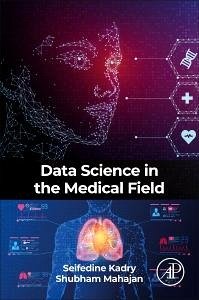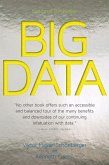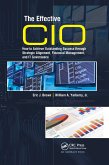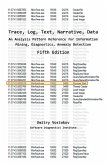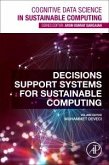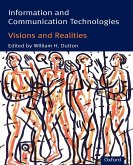- Broschiertes Buch
- Merkliste
- Auf die Merkliste
- Bewerten Bewerten
- Teilen
- Produkt teilen
- Produkterinnerung
- Produkterinnerung
Data science has the potential to influence and improve fundamental services such as the healthcare sector. This book recognizes this fact by analyzing the potential uses of data science in healthcare. Every human body produces 2 TB of data each day. This information covers brain activity, stress level, heart rate, blood sugar level, and many other things. More sophisticated technology, such as data science, allows clinicians and researchers to handle such a massive volume of data to track the health of patients. The book focuses on the potential and the tools of data science to identify the signs of illness at an extremely early stage.…mehr
Andere Kunden interessierten sich auch für
![Big Data Big Data]() Viktor Mayer-Sch NbergerBig Data15,99 €
Viktor Mayer-Sch NbergerBig Data15,99 €![The Effective CIO The Effective CIO]() Eric J BrownThe Effective CIO76,99 €
Eric J BrownThe Effective CIO76,99 €![Trace, Log, Text, Narrative, Data Trace, Log, Text, Narrative, Data]() Dmitry VostokovTrace, Log, Text, Narrative, Data76,99 €
Dmitry VostokovTrace, Log, Text, Narrative, Data76,99 €![Decision Support Systems for Sustainable Computing Decision Support Systems for Sustainable Computing]() Decision Support Systems for Sustainable Computing172,99 €
Decision Support Systems for Sustainable Computing172,99 €![Cybersecurity for the Home and Office Cybersecurity for the Home and Office]() John BandlerCybersecurity for the Home and Office76,99 €
John BandlerCybersecurity for the Home and Office76,99 €![Whole Enterprise Architecture Whole Enterprise Architecture]() Tom GravesWhole Enterprise Architecture19,99 €
Tom GravesWhole Enterprise Architecture19,99 €![Information and Communication Technologies Information and Communication Technologies]() Malcolm PeltuInformation and Communication Technologies91,99 €
Malcolm PeltuInformation and Communication Technologies91,99 €-
-
-
Data science has the potential to influence and improve fundamental services such as the healthcare sector. This book recognizes this fact by analyzing the potential uses of data science in healthcare. Every human body produces 2 TB of data each day. This information covers brain activity, stress level, heart rate, blood sugar level, and many other things. More sophisticated technology, such as data science, allows clinicians and researchers to handle such a massive volume of data to track the health of patients. The book focuses on the potential and the tools of data science to identify the signs of illness at an extremely early stage.
Hinweis: Dieser Artikel kann nur an eine deutsche Lieferadresse ausgeliefert werden.
Hinweis: Dieser Artikel kann nur an eine deutsche Lieferadresse ausgeliefert werden.
Produktdetails
- Produktdetails
- Verlag: Elsevier Science
- Seitenzahl: 255
- Erscheinungstermin: 25. September 2024
- Englisch
- Abmessung: 277mm x 216mm x 23mm
- Gewicht: 1216g
- ISBN-13: 9780443240287
- ISBN-10: 0443240280
- Artikelnr.: 70357882
- Herstellerkennzeichnung
- Libri GmbH
- Europaallee 1
- 36244 Bad Hersfeld
- gpsr@libri.de
- Verlag: Elsevier Science
- Seitenzahl: 255
- Erscheinungstermin: 25. September 2024
- Englisch
- Abmessung: 277mm x 216mm x 23mm
- Gewicht: 1216g
- ISBN-13: 9780443240287
- ISBN-10: 0443240280
- Artikelnr.: 70357882
- Herstellerkennzeichnung
- Libri GmbH
- Europaallee 1
- 36244 Bad Hersfeld
- gpsr@libri.de
Seifedine Kadry is a Professor in the Department of Mathematics and Computer Science, at Norrof University College, in Norway. He has a Bachelor's degree in 1999 from Lebanese University, MS degree in 2002 from Reims University (France) and EPFL (Lausanne), PhD in 2007 from Blaise Pascal University (France), HDR degree in 2017 from Rouen University. At present, his research focuses on data Science, education using technology, system prognostics, stochastic systems, and applied mathematics. He is an ABET program evaluator for computing, and ABET program evaluator for Engineering Tech. He is a Fellow of IET, Fellow of IETE, and Fellow of IACSIT. He is a distinguished speaker of IEEE Computer Society.
1. PPH 4.0: a privacy-preserving health 4.0 framework with machine learning
and cellular automata
2. An automatic detection and severity levels of COVID-19 using
convolutional neural network models
3. Biosensors and disease diagnostics in medical field
4. Brain tumor recognition and classification techniques
5. Identifying the features and attributes of various artificial
intelligence-based healthcare models
6. Classification algorithms and optimization techniques in healthcare
systems representation of dataset in medical applications
7. A knowledge discovery framework for COVID-19 disease from PubMed
abstract using association rule hypergraph
8. Predictive analysis in healthcare using data science: leveraging big
data for improved patient care
9. Data science in medical field: advantages, challenges, and opportunities
10. Decentralizing healthcare through parallel blockchain architecture:
transmitting internet of medical things data through smart contracts in
telecare medical information systems
11. Machine learning in heart disease prediction
12. U-Net-based approaches for brain tumor segmentation
13. Explainable image recognition models for aiding radiologists in
clinical decision making
14. Prediction of heart failure disease using classification algorithms
along with performance parameters
15. Cancer survival prediction using artificial intelligence: current
status and future prospects
16. Heart disease prediction in pregnant women with diabetes using machine
learning
17. Healthcare using image recognition technology
18. Integration of deep learning and blockchain technology for a smart
healthcare record management system
19. Internet of things based smart health and attendance monitoring system
in an institution for COVID-19
20. Medical diagnosis using image processing techniques
21. Harnessing the potential of predictive analytics and machine learning
in healthcare: empowering clinical research and patient care
22. Predictive analysis in healthcare using data science
23. Recommender systems in healthcare-an emerging technology
24. Robotics: challenges and opportunities in healthcare
25. A new era of the healthcare industry using Internet of Medical Things
26. Single cell genomics unleashed: exploring the landscape of
endometriosis with machine learning, gene expression profiling, and
therapeutic target discovery
27. Analyzing the success of the thriving machine prediction model for
Parkinson’s disease prognosis: a comprehensive review
and cellular automata
2. An automatic detection and severity levels of COVID-19 using
convolutional neural network models
3. Biosensors and disease diagnostics in medical field
4. Brain tumor recognition and classification techniques
5. Identifying the features and attributes of various artificial
intelligence-based healthcare models
6. Classification algorithms and optimization techniques in healthcare
systems representation of dataset in medical applications
7. A knowledge discovery framework for COVID-19 disease from PubMed
abstract using association rule hypergraph
8. Predictive analysis in healthcare using data science: leveraging big
data for improved patient care
9. Data science in medical field: advantages, challenges, and opportunities
10. Decentralizing healthcare through parallel blockchain architecture:
transmitting internet of medical things data through smart contracts in
telecare medical information systems
11. Machine learning in heart disease prediction
12. U-Net-based approaches for brain tumor segmentation
13. Explainable image recognition models for aiding radiologists in
clinical decision making
14. Prediction of heart failure disease using classification algorithms
along with performance parameters
15. Cancer survival prediction using artificial intelligence: current
status and future prospects
16. Heart disease prediction in pregnant women with diabetes using machine
learning
17. Healthcare using image recognition technology
18. Integration of deep learning and blockchain technology for a smart
healthcare record management system
19. Internet of things based smart health and attendance monitoring system
in an institution for COVID-19
20. Medical diagnosis using image processing techniques
21. Harnessing the potential of predictive analytics and machine learning
in healthcare: empowering clinical research and patient care
22. Predictive analysis in healthcare using data science
23. Recommender systems in healthcare-an emerging technology
24. Robotics: challenges and opportunities in healthcare
25. A new era of the healthcare industry using Internet of Medical Things
26. Single cell genomics unleashed: exploring the landscape of
endometriosis with machine learning, gene expression profiling, and
therapeutic target discovery
27. Analyzing the success of the thriving machine prediction model for
Parkinson’s disease prognosis: a comprehensive review
1. PPH 4.0: a privacy-preserving health 4.0 framework with machine learning
and cellular automata
2. An automatic detection and severity levels of COVID-19 using
convolutional neural network models
3. Biosensors and disease diagnostics in medical field
4. Brain tumor recognition and classification techniques
5. Identifying the features and attributes of various artificial
intelligence-based healthcare models
6. Classification algorithms and optimization techniques in healthcare
systems representation of dataset in medical applications
7. A knowledge discovery framework for COVID-19 disease from PubMed
abstract using association rule hypergraph
8. Predictive analysis in healthcare using data science: leveraging big
data for improved patient care
9. Data science in medical field: advantages, challenges, and opportunities
10. Decentralizing healthcare through parallel blockchain architecture:
transmitting internet of medical things data through smart contracts in
telecare medical information systems
11. Machine learning in heart disease prediction
12. U-Net-based approaches for brain tumor segmentation
13. Explainable image recognition models for aiding radiologists in
clinical decision making
14. Prediction of heart failure disease using classification algorithms
along with performance parameters
15. Cancer survival prediction using artificial intelligence: current
status and future prospects
16. Heart disease prediction in pregnant women with diabetes using machine
learning
17. Healthcare using image recognition technology
18. Integration of deep learning and blockchain technology for a smart
healthcare record management system
19. Internet of things based smart health and attendance monitoring system
in an institution for COVID-19
20. Medical diagnosis using image processing techniques
21. Harnessing the potential of predictive analytics and machine learning
in healthcare: empowering clinical research and patient care
22. Predictive analysis in healthcare using data science
23. Recommender systems in healthcare-an emerging technology
24. Robotics: challenges and opportunities in healthcare
25. A new era of the healthcare industry using Internet of Medical Things
26. Single cell genomics unleashed: exploring the landscape of
endometriosis with machine learning, gene expression profiling, and
therapeutic target discovery
27. Analyzing the success of the thriving machine prediction model for
Parkinson’s disease prognosis: a comprehensive review
and cellular automata
2. An automatic detection and severity levels of COVID-19 using
convolutional neural network models
3. Biosensors and disease diagnostics in medical field
4. Brain tumor recognition and classification techniques
5. Identifying the features and attributes of various artificial
intelligence-based healthcare models
6. Classification algorithms and optimization techniques in healthcare
systems representation of dataset in medical applications
7. A knowledge discovery framework for COVID-19 disease from PubMed
abstract using association rule hypergraph
8. Predictive analysis in healthcare using data science: leveraging big
data for improved patient care
9. Data science in medical field: advantages, challenges, and opportunities
10. Decentralizing healthcare through parallel blockchain architecture:
transmitting internet of medical things data through smart contracts in
telecare medical information systems
11. Machine learning in heart disease prediction
12. U-Net-based approaches for brain tumor segmentation
13. Explainable image recognition models for aiding radiologists in
clinical decision making
14. Prediction of heart failure disease using classification algorithms
along with performance parameters
15. Cancer survival prediction using artificial intelligence: current
status and future prospects
16. Heart disease prediction in pregnant women with diabetes using machine
learning
17. Healthcare using image recognition technology
18. Integration of deep learning and blockchain technology for a smart
healthcare record management system
19. Internet of things based smart health and attendance monitoring system
in an institution for COVID-19
20. Medical diagnosis using image processing techniques
21. Harnessing the potential of predictive analytics and machine learning
in healthcare: empowering clinical research and patient care
22. Predictive analysis in healthcare using data science
23. Recommender systems in healthcare-an emerging technology
24. Robotics: challenges and opportunities in healthcare
25. A new era of the healthcare industry using Internet of Medical Things
26. Single cell genomics unleashed: exploring the landscape of
endometriosis with machine learning, gene expression profiling, and
therapeutic target discovery
27. Analyzing the success of the thriving machine prediction model for
Parkinson’s disease prognosis: a comprehensive review

